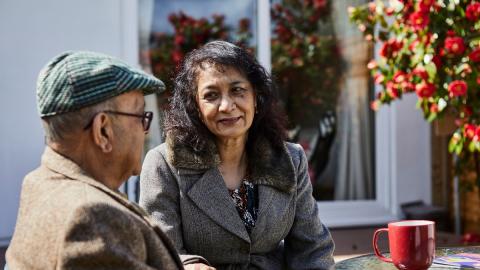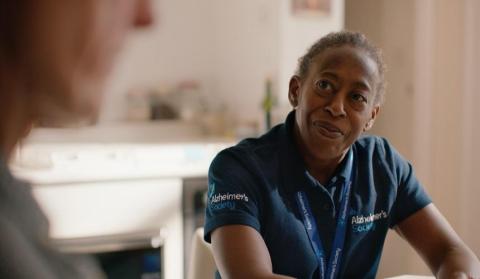Our Help and Hope strategy
We know the steps it will take to create a future where dementia no longer devastates lives. And we're leading the way, taking those crucial steps with people from all the spheres of life dementia touches.
Dementia is the UK's biggest killer
Dementia affects us all, and it devastates lives. Its cruelty overwhelms those living with it. Its scale overwhelms the NHS, social care and the economy. Its complexity poses overwhelming challenges in how we research, diagnose and treat it.
It will take a society to beat dementia
We can only achieve our mission by working together with all those who are affected by dementia. Because it will take a society to beat it.
We understand all aspects of the condition, so we are uniquely placed to give support to those who need it, campaign to improve experiences, and to fund ground-breaking research.
Four priorities to 2030
Our Help and Hope strategy is about getting in early to address the effects of dementia, preventing crisis, preventing people becoming overwhelmed, and preventing lives being devastated.
1. Increasing accurate and easier diagnosis
We need to ensure more people have access to an earlier, easier, faster and more accurate diagnosis. This will improve experiences along with access to support, treatment and research opportunities.
2. Support and treatment to prevent crisis
To ensure everyone diagnosed with dementia, or more widely affected by a dementia diagnosis, regardless of health inequalities, gets appropriate support to prevent crises and plan ahead.
3. Make dementia a priority
To drive change in the wider health and social care system, for research, for the general public and for our supporters.
4. Effective organisation
To ensure we are efficient, effective and transparent in the way that we work, trusted by our stakeholders and representative of the communities we serve. We are experts in dementia and informed by the lived experience of people affected by it.
Our impact as an organisation
To create a future where dementia no longer devastates lives, our strategy to 2030 focuses on our impact.
Our impact as an organisation is:
- To drive change globally, nationally and locally - Globally, through our contributions to ground breaking research, and nationally and locally through our expert influencing of health and care systems.
- To reduce the devastating impact of dementia at a human level. We ensure people with dementia are diagnosed earlier, and have access to better support and treatment.
- Establish ourselves as leaders in the system - We'll do this at a local and national level, demonstrating our expertise in dementia and our unique view of the whole of the problem - understanding the complexity of the challenge and the scale of the solution.
- Use robust evidence - We’ll commission and generate evidence through, ours and others, evaluation of what works and what doesn’t.
- Improve effectiveness - We'll learn lessons as we go, feeding them into our understanding of the solution and improving our own effectiveness.
- Listen to people - We'll involve people affected by dementia now and those who will be affected in the future in our work.
- Amplify voices - We’ll amplify the voices and needs of those affected by dementia now and in the future.
- Innovate - We'll lead the way in new breakthroughs, in delivering support, engaging with underserved communities and in making improvements for those who need it - now and in the future.
Our vision for 2050
- Alzheimer's disease - We know by 2050 Alzheimer’s disease will be cured or treatable.
- Prevention - People with other types of dementia will be able to lead a better quality of life because increased and affordable disease detection will be available. This will lead to faster diagnosis and access to more responsive, next generation treatments and interventions.
- Living with dementia - Those who get dementia will live with it rather than die from it. Population-level screening will lead to more people understanding and managing their risk of dementia.
- Accessible to all - An increased confidence in treatment and support will make dementia a low stigma disease so people will feel comfortable getting an early diagnosis. Everyone, no matter where they live, will have access to screening, early detection, treatment, support, and an equal expectation of a higher number of years with good quality of life.
- The state of care - We also know that the health and social care systems, as they currently exist, will not be able to deliver the care people need, at the scale needed. Most people will get support through community and home-based care.




